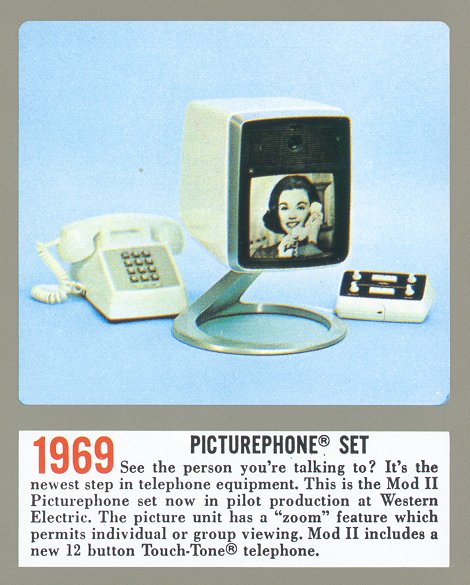Mobile video calls, modern freak show

Third-generation mobile communications have been actively “sweeping” around the planet for several years, successfully deploying a new communications standard and new high-speed communications capabilities of the mobile era. Fast mobile Internet, mobile TV, video-call, new services based on embedded cameras are all now available 3G consumer in Europe, USA or Japan.
However, no one has yet betrayed the postulate that with the introduction of video communication, we lose part of the right to “privacy” and “harboring” information from the caller and become completely open in the new era of mobile panopticon. ”
')
The history of video conferencing dates back to the beginning of the 60s, when American laboratories carried out the first experiments using the transmission of an extremely not-clear black and white signal with a resolution of 200 lines for subsequent commercial integration into “videophones.” However, after the colossal furore at various exhibitions, such a device did not enjoy commercial demand having only over 500 subscribers as of 1974.

As long as the opportunity to go to the “video link” was tied to stationary or semi-stationary (laptops, tablets, and the like) devices, as well as various standards and their incompatibility - it was obvious that no harm and even more danger “Privacy” does not carry such technology. Rather, “video calls” by SKYPE are rather a pleasant addition to a friendly conversation, rather than an obvious need. However, even at this moment, almost every one of us has a 3G phone that supports two-way video communication, which at launch 3G networks are already ready to become a source for video broadcasting of all that - what is happening before our eyes. One time, the opportunity about which they have spoken and discussed so much now lives in the “tube” of each of us.
And already after the “field trials” - when, after the demonstration period, consumers “get into it” by transmitting everything that is possible to each other, a new moral question will arise before society:
- “Where is the edge of personal space and personal right of each of us in agreement or denial of the opportunity to show what is happening at the moment?” "

When mobile communications became widespread, parents thought they were in control of their children. At least the voice response of the child to the question of adults “Where are you?”, Consisting in the phrase “With friends” or “I do my homework” was enough to calm the second, and the first to give the opportunity to quietly finish the bought beer in the crowd of friends. Like children , husbands hide their location from their wives - saying that they are in the office, in negotiations, with colleagues in a restaurant and will be much later than 12 nights. Such examples can be continued endlessly, only one thing is true - in a digital mobile society, our every step becomes extremely transparent.
Voice communications did not give an opportunity to check “whether this is really so,” but left “on faith” everything that happens. However, as soon as “a priori” there is an opportunity to “check” what is happening, each of us will be faced with a similar moral choice - to refuse almost impossible. Moreover, unlike voice communications - the experience of using in a society that goes back to almost a hundred years, types of telecommunications were widespread among “professionals” (reporters, business conferences) and practical Key not used by private individuals. Therefore, there are no rules of “etiquette” and “traditions” when making a video call.
Similar public “resonance” was caused by AGPS service “Navigator” from Megafon, which allows to determine the coordinates of a Megaphone subscriber (subject to connection and agreement with the request). It became a “ stumbling block ” in many “controversial” family (and not only family) situations, but the presence of this service with one operator - the difficulty in connecting and using it did not allow it to become “standard”.
Video telephony is already a standard function embedded in our mobile terminals; moreover, it is not dependent on the operator and its platform solution, and the faster the third generation networks are deployed, the wider and wider the introduction and use of this “mobile eye” practice will certainly be. Each of us will have the opportunity to refuse to “receive” a video call, turn off the phone, make an “appearance” that “did not hear” or “did not see” the incoming call, but we all understand that we are constant such actions will not increase respect for us in the eyes of others.
IM - in a mobile phone has become for us a “de facto” standard, we already feel not quite comfortable when we understand that there is no “mobile Internet” in this area and there is no possibility to check email or contact close people ....
But none of us think that the hyper-active development of such an online presence made us “transparent” in front of other people violating (or rather deforming) the existing boundaries and rules of personal privacy. One fine moment when we see the cherished abbreviation “3G ”On the screen of your terminal, the built-in camera will become a real“ mobile freak show ”

* - Panopticum - the project of the ideal prison of Jeremiah Bentham, when one guard can monitor all prisoners at the same time. In the project, the prison is a cylindrical structure with glass internal partitions. The guard is in the center, but invisible to prisoners. Prisoners do not know at what exact time they are being watched and they have the impression of constant monitoring. Thus they become ideal prisoners.
Source: https://habr.com/ru/post/22903/
All Articles